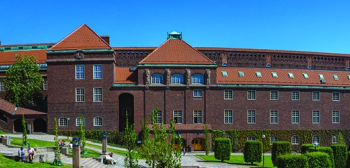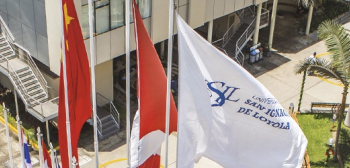- #=147 QS Global World Ranking
- PublicStatus
- Very HighResearch Output
- 29,667Total Students
- 2,355Faculty
- 5,333Int'l Students
The University’s position in the current QS World University Rankings.
Whether the University is funded by the government of that country or state, or funded by private donations.
The research intensity of the University, based on the number of papers output relative to the University’s size.
The number of full time equivalent students enrolled at the University.
The number of full time equivalent teaching staff employed by the University.
The number of full time equivalent international students enrolled at the University.
Stockholm University
About
Stockholm University offers more than 75 master’s programmes taught in English within the following areas:
- Computer Science
- Business and Economics
- Arts and Humanities
- Media and Communications
- Human, Social and Political Science and Law
- Science and Mathematics
- Languages and Linguistics
A requirement for all Master's programmes is the possession of a Bachelor's degree from an accredited institution of higher learning, corresponding to at least 180 credits in the European Credit Transfer System. The specific requirements vary between the programmes. Most programmes have requirements of a specific major subject in your Bachelor's degree.
All courses and programmes at Stockholm University require proof of proficiency in English. You can demonstrate that you meet the English language requirement through certain upper secondary (high school) studies, certain university studies, or an internationally approved English test:
- IELTS: An overall mark of 6.5 and no section below 5.5.
- TOEFL iBT (We do not accept TOEFL ITP) Internet-based: Total score of 90 with minimum score of 20 in written test.
Individuals who are citizens of countries outside of the European Union (EU), the European Economic Area (EEA) and Switzerland are required to pay application and tuition fees. The tuition fee per academic year for studies within the Humanities/Social Sciences/Law is SEK 90,000 and within the Sciences SEK 140,000.
All prospective students regardless of country of origin, should apply via the national admissions website www.universityadmissions.se. Apply by 15 January each year.
How to apply – a step-by-step guide: http://www.su.se/english/education/application-admissions/application-a-step-by-step-guide.
Swedish language courses are offered at different levels for both international and exchange students. The courses are normally taken in addition to the main course selection and are free of charge.
About
Stockholm University offers more than 75 master’s programmes taught in English within the following areas:
- Computer Science
- Business and Economics
- Arts and Humanities
- Media and Communications
- Human, Social and Political Science and Law
- Science and Mathematics
- Languages and Linguistics
A requirement for all Master's programmes is the possession of a Bachelor's degree from an accredited institution of higher learning, corresponding to at least 180 credits in the European Credit Transfer System. The specific requirements vary between the programmes. Most programmes have requirements of a specific major subject in your Bachelor's degree.
All courses and programmes at Stockholm University require proof of proficiency in English. You can demonstrate that you meet the English language requirement through certain upper secondary (high school) studies, certain university studies, or an internationally approved English test:
- IELTS: An overall mark of 6.5 and no section below 5.5.
- TOEFL iBT (We do not accept TOEFL ITP) Internet-based: Total score of 90 with minimum score of 20 in written test.
Individuals who are citizens of countries outside of the European Union (EU), the European Economic Area (EEA) and Switzerland are required to pay application and tuition fees. The tuition fee per academic year for studies within the Humanities/Social Sciences/Law is SEK 90,000 and within the Sciences SEK 140,000.
All prospective students regardless of country of origin, should apply via the national admissions website www.universityadmissions.se. Apply by 15 January each year.
How to apply – a step-by-step guide: http://www.su.se/english/education/application-admissions/application-a-step-by-step-guide.
Swedish language courses are offered at different levels for both international and exchange students. The courses are normally taken in addition to the main course selection and are free of charge.
University highlights
- 2012#171
- 2014#170
- 2015#=182
- 2016#=182
- 2017#=196
- 2018#=195
- 2019#=200
- 2020#191
- 2021#=181
- 2022#148
- 2023#153
- 2024#118
- 2025#128
- 2026#=147
Campus locations
Stockholm, SE,
Stockholm , Sweden , 106 91
Bergius Botanic Garden,
Gustafsborgsvägen 4 , Stockholm , Sweden ,
Campus Frescati,
Universitetsvägen , Stockholm , Sweden ,
Campus Kista,
Borgarfjordsgatan 12 , Stockholm , Sweden ,
Campus Kräftriket,
Kräftriket , Stockholm , Sweden ,
Campus Sveaplan,
Sveaplan , Stockholm , Sweden ,
Similar Universities
University West
Trollhättan
Stockholm School of Economics
Sveavägen 65, Stockholm
Karolinska Institutet
Nobels vag 6, Stockholm
School of Hotel and Tourism Management, The Hong Kong Polytechnic University
17 Science Museum Road, Tsim Sha Tsui East, Kowloon, Hong Kong,
Universidad de Monterrey (UDEM)
Av. Ignacio Morones Prieto 4500, Nuevo Leon
801-1000 QS World University Rankings 4 QS starsUniversity of Miami Patti and Allan Herbert Business School (Miami Herbert)
221 Jenkins Building, Coral Gables
Related content

Top Anthropology Schools in…

Stockholm

International Scholarships f…

How Being Bilingual Makes Y…

Universities in Scandinavia…

Revision Tips and Eating Chi…

Top Universities for Natural…

Top Universities for Arts an…

10 Unusual Courses You Didn’…

Top Universities in Canada 2…
Test preparations
Featured University


-
10 UG & 47 PGTotal courses
-
Private for ProfitStatus
-
HighResearch output
















